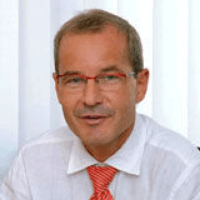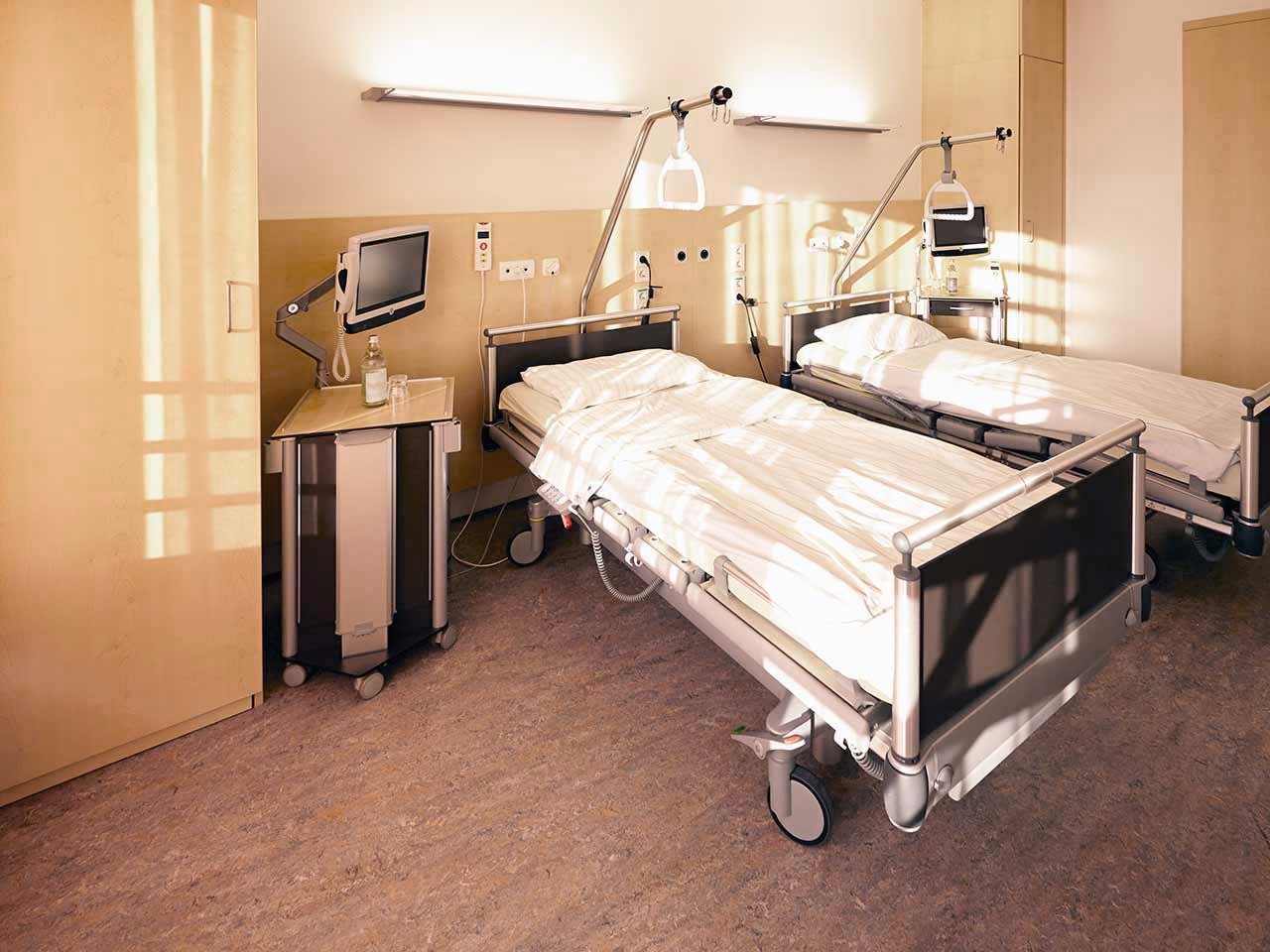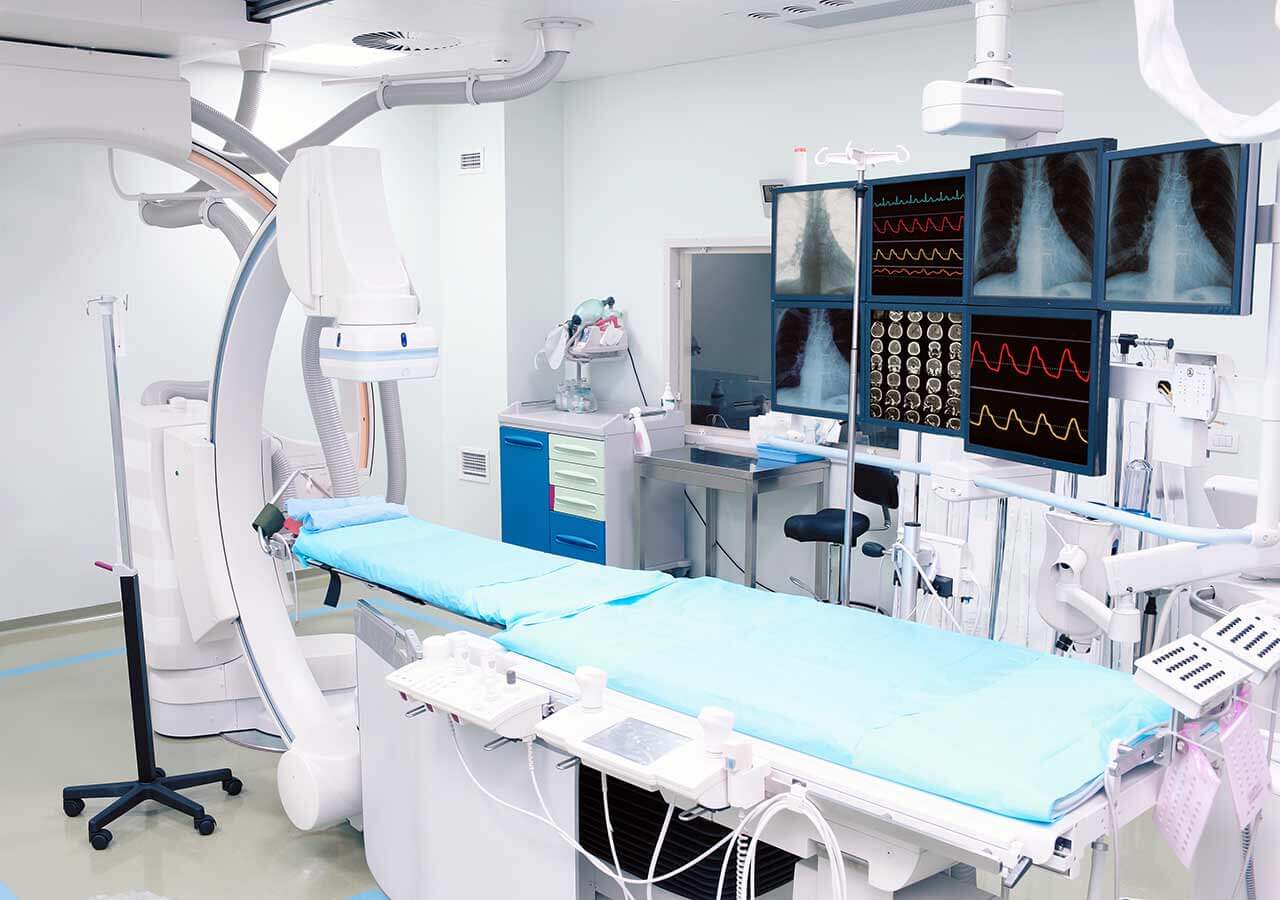
The program includes:
- Initial presentation in the clinic
- clinical history taking
- review of medical records
- physical examination
- laboratory tests:
- complete blood count
- biochemical analysis of blood
- inflammation indicators
- indicators blood coagulation
- abdominal ultrasound
- colonoscopy, sigmoidoscopy with biopsy
- conservative treatment with:
- anti-inflammatory agents such as 5-ASA
- systemic corticosteroids
- topical corticosteroids
- immunomodulators
- symptomatic treatment
- control examinations
- cost of essential medicines and materials
- nursing services
- full hospital accommodation
- explanation of future recommendations
Required documents
- Medical records
- Colonoscopy (if available)
Service
You may also book:
 BookingHealth Price from:
BookingHealth Price from:
About the department
The Department of Gastroenterology, Hepatology and Infectology at the University Hospital Jena offers the full range of diagnostics and treatment for patients with gastrointestinal diseases ranging from the esophagus to the rectum, pancreas, liver, gallbladder and biliary tract. In addition, the treatment of acute and chronic infections is carried out in close cooperation with the specialized Center for Infectious Medicine. The competence also includes the provision of emergency care to patients with all diseases in the field of internal medicine. The clinical practice is based on the use of the very latest technical equipment, innovative treatment methods and high-precision diagnostic options, which in combination with the outstanding professionalism of doctors helps to achieve the best therapy result. The department is headed by Prof. Dr. med. Andreas Stallmach.
As a university medical facility, the department is actively engaged in studying the causes of gastroenterological diseases, particularly chronic inflammatory bowel diseases, Crohn's disease and ulcerative colitis, as well as chronic liver diseases. It conducts a large number of clinical trials, which makes it possible to offer each patient the best treatment options adapted to the particular clinical case. Another research focus is the improvement of early diagnostics using modern endoscopic procedures.
The department is part of the Endoscopy Center (together with the Department of General and Abdominal Surgery), which has the state-of-art medical equipment for all types of endoscopic examinations of the esophagus, stomach, small intestine, biliary tract and pancreas. In addition to the diagnostics, special attention is paid to endoscopic treatment of various diseases of the gastrointestinal tract, liver, pancreas and bile ducts. For example, the department widely uses endoscopic procedures to stop gastrointestinal hemorrhage, remove polyps (precursors of cancer), esophageal or bile duct stent implantation in case of obstruction of various origins. In addition, the spectrum is complemented by photodynamic therapy (for example, for the treatment of esophageal or bile duct tumors). The endoscopic procedures are sparing treatments (help to avoid surgery), but they are no less effective than traditional interventions.
The department specializes in the diagnostics and treatment of the following diseases:
- Gastroenterology
- Chronic inflammatory bowel diseases
- Gastrointestinal tumors
- Biliary tract diseases
- Pancreatic diseases
- Hepatology
- Autoimmune liver diseases
- Infectious liver diseases
- Toxic liver diseases (especially associated with the effects of alcohol abuse)
- Iron overload disorders
- Infectology
- Infection with multi-resistant pathogens
- Pneumonia, tuberculosis and other respiratory infections
- HIV and AIDS
- Other diseases
The diagnostic and therapeutic range in the field of endoscopy includes:
- Esophagogastroduodenoscopy
- Chromo- and video endoscopy
- Urease short-term test for helicobacter pylori
- Treatment of esophageal varices using ligation or sclerotherapy
- Dilatation of benign and malignant stenoses of the esophagus, stomach and upper small intestine
- Treatment of achalasia cardia using pneumatic dilatation
- Treatment of bleeding gastrointestinal ulcers using injections, clamps, fibrin glue
- Mucosectomy in dysplasia/early stages of esophageal and gastric cancer
- Polypectomy
- Implantation of metal endoprostheses for the treatment of malignant stenosis of the esophagus, stomach, duodenum
- Argon plasma and laser coagulation therapy for stenosing or bleeding tumors
- Deeper duodenal biopsy for the diagnostics of malabsorption syndromes
- Percutaneous endoscopic gastrostomy
- Panendoscopy for the diagnostics of hemorrhages or tumors in the jejunum
- Endoscopic retrograde cholangiopancreatography
- Video endoscopy
- Papillotomy
- Dilatation of benign and malignant stenoses of the biliary tract and pancreatic ducts
- Implantation of plastic and metal stents in bile duct stenoses
- Implantation of plastic stents in pancreatic duct stenoses
- Extraction of stones from the bile ducts and pancreas
- Colonoscopy
- Video endoscopy
- Polypectomy
- Dilatation of benign and malignant stenoses in inflammatory bowel disease or cancer
- Argon plasma and laser coagulation therapy for stenosing or bleeding tumors
- Endoscopic ileal examination
- Gastroscopy
- Other medical services
Curriculum vitae
- 1978 - 1985 Study of Medicine at the Free University of Hamburg.
- 1983 - 1985 PhD thesis defense with honors, Department of Pediatrics, University Hospital Hamburg-Eppendorf. Subject: "The effect of gliadin fractions on the culture of intestinal cells – the studies of the enterotoxicity and immunogenicity of partial gliadin hydrolysates in the pathogenesis of celiac disease in vitro".
- 1985 Admission to medical practice.
- 1985 - 1986 Research Fellow, Department of Internal Medicine with a focus on Gastroenterology (under the guidance of Prof. Dr. med. E.O. Riecken).
- 1986 - 1988 Research activities within the Research Project funded by the German Research Foundation: "The significance of extracellular matrix in gastrointestinal diseases" and provision of special consultations for patients with chronic inflammatory bowel diseases.
- 1988 - 1993 Research Fellow, Department of Internal Medicine with a focus on Gastroenterology (under the guidance of Prof. Dr. med. E.O. Riecken).
- 1993 - 1994 Senior Physician, Department of Internal Medicine with a focus on Gastroenterology (under the guidance of Prof. Dr. med. E.O. Riecken).
- 11.1993 Habilitation and Venia Legendi in Internal Medicine. Subject: "Expression and function of cell adhesion molecules and their changes during malignant transformation in the colon".
- Since 1994 Senior Physician in the Department of Internal Medicine II at the University Hospital Saarland.
- 1994 Election as a Chairman of the German Working Group on Chronic Inflammatory Bowel Diseases (DACED), 1995-1996.
- 1996 Election to the Admission Board of the German Society for Digestive and Metabolic Diseases (Section on Small and Large Intestine Diseases).
- 07.1996 - 06.1999 Scholar of the Heisenberg Foundation of the German Research Foundation.
- 12.1997 Premature assignment of the title of an Extraordinary Professor at the Saar University.
- Since 01.2001 Leading Senior Physician in the Department of Internal Medicine II at the University Hospital Saarland.
- 01.2001 Board Member of the Working Group on Rhineland-Palatinate/Saar Gastroenterology (GARPS).
- 10.2001 Election as a President of the Working Group (for one year) on Rhineland-Palatinate/Saar Gastroenterology (GARPS).
- 09.2003 - 02.2006 Head of the Department of Gastroenterology, Hepatology and Dietetics, Marienhospital Clinic, Network of Catholic Hospitals Essen-North-West.
- Head of the Department of Gastroenterology, Hepatology and Infectology at the University Hospital Jena.
Additional Qualifications
- 30.06.1993 Professional certification in Internal Medicine.
- 11.01.1996 Specialization in Gastroenterology.
- 13.11.1996 Theoretical basis of the specialty, X-ray diagnostics in Internal Medicine.
- 04.11.1997 Theoretical basis of the specialty, laboratory tests in Internal Medicine (1st and 2nd part).
- Since 04.2002 Recognition as a Medical Specialist in Diabetology (German Diabetes Association).
Research Focuses
- Function of gut-associated immune system.
- Chronic inflammatory bowel diseases (Crohn's disease, ulcerative colitis, celiac disease).
- Innovative endoscopy for the examination of tumors and vascularization of the gastrointestinal tract.
Photo of the doctor: (c) Universitätsklinikum Jena
About hospital
According to the prestigious Focus magazine, the University Hospital Jena regularly ranks among the top German medical facilities!
The hospital has positioned itself as a multidisciplinary medical facility with a long history of more than 200 years. Since its foundation, the hospital has been constantly developing and modernizing, thanks to which nowadays it offers patients the highest level of treatment in Germany based on the use of innovative technologies and the very latest therapeutic techniques. The hospital consists of 26 specialized departments and 25 research institutes. It treats more than 53,600 inpatients and about 274,000 outpatients every year. The staff of the hospital includes more than 5,600 competent doctors.
The extensive resources of the university hospital, high treatment standards, and the introduction of new research developments provide first-class treatment in Germany meeting the stringent international standards. The hospital has an excellent reputation not only in Germany, but also far beyond its borders, due to which it accepts a large number of foreign patients for the diagnostics and treatment.
Despite the technical progress and the availability of accurate computerized systems, the patient’s physical health and emotional state is the main value of each employee of the hospital, since some diagnoses cause emotional distress in patients. The doctors of the hospital believe that the key to a successful result is a comprehensive and individual approach, so they spend a lot of time talking with patients, listen carefully to all their wishes and support at all stages of the therapeutic process. All this in combination with high-precision diagnostic techniques and the very latest types of therapy forms a solid basis for the achievement of an optimal treatment result.
Photo: (c) depositphotos
Accommodation in hospital
Patients rooms
The patients of the University Hospital Jena live in comfortable single and double rooms made in a modern design. Each patient room is equipped with an ensuite bathroom with shower and toilet. The room has enough space to store personal belongings, as well as a table and chairs for receiving visitors. A bedside table can be converted into a table so that patients can eat right in their bed. Each room has a TV, and there is also access to the Internet. In addition, the hospital offers enhanced-comfort rooms.
Meals and Menus
The patient and his accompanying person have a daily choice of three menus. If for some reason the patient does not eat all the foods, he will be offered an individual menu. Please inform the medical staff about your dietary preferences prior to the treatment.
Further details
Standard rooms include:
Religion
Religious services are available upon request.
Accompanying person
During the inpatient program, an accompanying person may stay with you in a room or at the hotel of your choice.
Hotel
During the outpatient program, you can live at a hotel of your choice. Managers will help you to choose the most suitable options.





